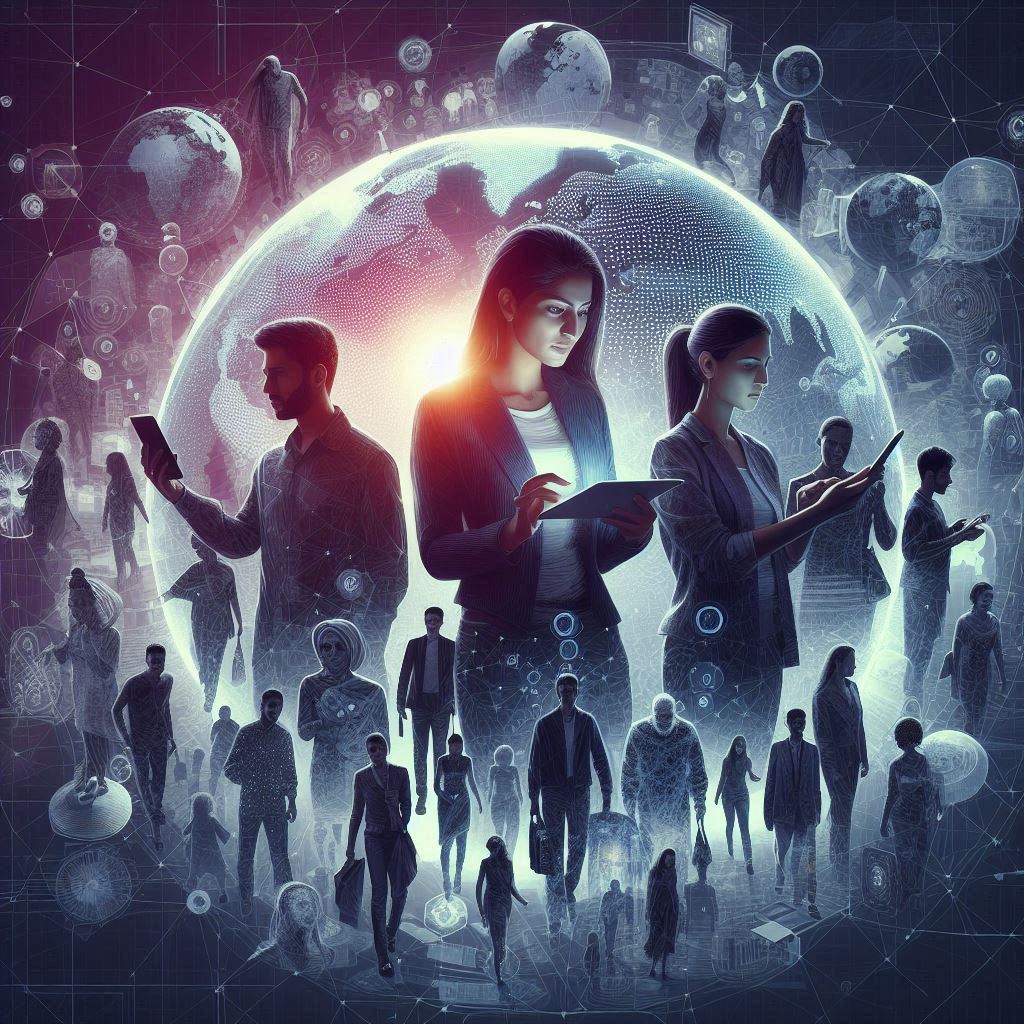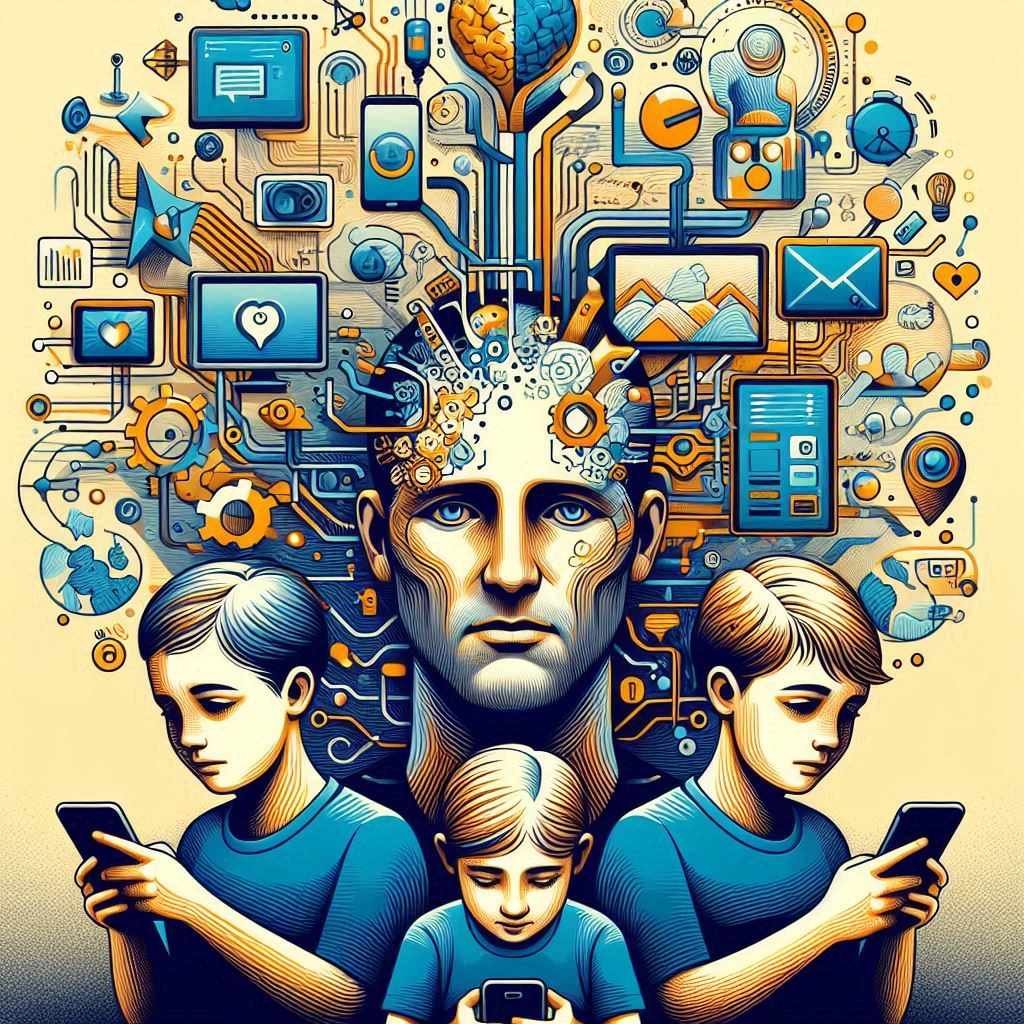The Impact of Technology on Human Relationships


Discussing Technology and Communication
- How has technology changed the way people communicate with each other?
- Do you think social media has made it easier or harder to form genuine relationships? Why?
- How do you feel about online friendships compared to face-to-face friendships? Are they equally valuable?
- How has texting or messaging affected the way you express yourself? Do you find it easier or harder to communicate your feelings?
- What role does technology play in maintaining long-distance relationships? Is it a good substitute for in-person interaction?
- Do you think people are becoming more isolated because of technology? Why or why not?
Exploring the Positive and Negative Effects
- What are some positive effects of technology on relationships? Can you give examples?
- What are some negative effects of technology on relationships? How can these be addressed?
- Do you think technology has made it easier to stay connected with friends and family, or has it created more distractions?
- How do you think the use of technology in relationships will change in the next 10 years?
- What impact does social media have on your self-esteem or the way you view relationships?
- How do you think technology affects communication between different generations, such as between parents and children or grandparents and grandchildren?
Conversations About Balancing Technology and Real-Life Interactions
- How do you balance your time between online interactions and face-to-face interactions?
- Do you think it’s important to have “unplugged” time, where you disconnect from technology? Why or why not?
- How do you feel when someone is constantly on their phone while you’re spending time together? How does it affect your relationship with them?
- Do you think there are situations where technology should be limited or avoided? What are some examples?
- How do you handle conflicts or misunderstandings that arise from online communication?
- Do you think technology has changed the way people date or form romantic relationships? If so, how?
The Impact of Technology on Human Relationships
Technology has revolutionized the way people communicate and form relationships, affecting both the depth and dynamics of human interactions. While it offers convenience and connectivity, it also raises questions about how it influences the quality of relationships. Below, I’ll explain and describe the major ways technology impacts relationships, followed by debate topics that explore these complexities.
Enhanced Communication
One of the primary positive effects of technology is the ease of communication. Through social media, messaging apps, video calls, and email, people can stay in touch with friends, family, and colleagues, no matter where they are. Long-distance relationships—both romantic and platonic—are now easier to maintain with tools like FaceTime, Zoom, and WhatsApp. Technology allows people to share experiences instantly, bridging geographical gaps.
However, constant access to communication can blur the lines between personal time and social engagement. Instant messaging sometimes creates pressure to be constantly available, leading to anxiety or social burnout.
Superficial Connections
While technology makes it easier to connect with people, these connections can sometimes be superficial. Social media platforms, for example, encourage users to present a curated version of their lives, which can foster unrealistic expectations of relationships and interactions. People may have thousands of friends or followers online, but very few meaningful, deep connections.
Additionally, online communication often lacks the emotional depth of face-to-face interactions. Non-verbal cues, such as facial expressions and body language, are key to understanding emotions and building relationships. Digital communication can miss out on these subtle forms of human connection.
Social Media and Self-Esteem
Social media often creates an environment where users compare their lives to others, which can affect self-esteem and mental health. Many people feel pressure to present a perfect image online, leading to feelings of inadequacy or loneliness. The constant flow of likes, comments, and shares can influence how people perceive their self-worth, which in turn affects their relationships with others.
On the flip side, social media can also be a space for support and community. Many individuals find like-minded groups and build meaningful connections online, especially if they share interests or face similar challenges.
Changing Family Dynamics
Technology also affects family relationships. With the rise of smartphones, tablets, and streaming services, families may spend less time engaging in traditional in-person activities like meals or conversations. It’s common to see family members physically together but mentally distracted by their devices.
However, technology can also bring families closer, especially those separated by distance. Parents and children can stay in touch throughout the day with messaging apps, and families can share important moments even if they aren’t physically together.
Work-Life Balance and Relationship Strain
Increased connectivity through technology has blurred the boundaries between work and personal life. Many people feel the need to stay connected to work through emails and messaging apps outside of office hours, which can strain personal relationships. This constant availability can lead to stress and reduce the quality time people spend with their loved ones.
At the same time, technology has enabled remote work, which can offer flexibility and more time at home, potentially improving work-life balance for some.
Conclusion
Technology has had a profound impact on human relationships, offering both opportunities and challenges. While it provides tools for greater connection and communication, it can also lead to superficial interactions, mental health issues, and disrupted family dynamics. Debating these topics allows students to critically analyze the role of technology in their lives and consider the best ways to navigate their relationships in a digital age.
Topics for Debate
Is Technology Strengthening or Weakening Human Relationships?
- Some argue that technology, especially social media, allows people to stay connected in ways never before possible. Others believe it fosters superficial relationships, weakening deep, meaningful connections.
- Debate Question: Does technology improve the quality of human relationships or harm them?
Are Online Friendships as Valuable as Face-to-Face Friendships?
- The rise of online communities has led many to build friendships with people they may never meet in person. Some argue these friendships are just as valuable as in-person relationships, while others believe face-to-face interactions are essential for deep connections.
- Debate Question: Are online friendships and relationships as meaningful as face-to-face ones?
Is Social Media More Harmful Than Helpful for Mental Health?
- Social media can be a source of validation, but it can also lead to anxiety, depression, and low self-esteem due to comparison culture. While some find it a supportive community, others struggle with its negative impacts.
- Debate Question: Does social media have a positive or negative impact on mental health?
Should Families Limit Technology Use at Home?
- Technology can disrupt family dynamics by pulling individuals into their own digital worlds. On the other hand, technology can provide entertainment and keep family members connected. The question arises whether limits should be set on technology use to encourage in-person interactions.
- Debate Question: Should families impose limits on the use of technology in the home?
Has Technology Improved or Worsened Work-Life Balance?
- Technology allows for more flexible work arrangements, such as remote work, but it also blurs the line between work and home life, causing stress. This has sparked debate over whether technology has made balancing work and personal life easier or harder.
- Debate Question: Has technology improved work-life balance, or has it made it harder to separate work from personal life?
Is Constant Connectivity Creating a More Anxious Society?
- The pressure to be constantly available and responsive due to technology is leading many to experience anxiety. While some argue that staying connected provides security and convenience, others believe it’s contributing to societal stress and burnout.
- Debate Question: Is constant connectivity through technology contributing to increased anxiety and stress?
Are Digital Nomads and Remote Workers Improving or Damaging Relationships?
- The ability to work remotely has allowed people to travel and live flexible lifestyles, but does this freedom come at the cost of stable relationships? While some say remote work provides a better work-life balance, others think it isolates individuals from meaningful connections.
- Debate Question: Does remote work improve personal relationships or create a sense of isolation?
Writing and Reflecting on the Role of Technology
- Write about a time when technology helped you strengthen a relationship. What happened, and how did it impact your relationship?
- Imagine a day without any technology. How would it affect your interactions with others? Would it be a positive or negative experience?
- Write an essay on the importance of maintaining a balance between online and offline communication. How can people achieve this balance?
- Reflect on how technology has influenced your own relationships. Has it mostly been positive, negative, or a mix of both?
- Describe how you would use technology to maintain a long-distance friendship or relationship. What tools or strategies would you use?
- Write about your thoughts on the future of human relationships in a world that is becoming increasingly digital. What challenges and opportunities do you foresee?
